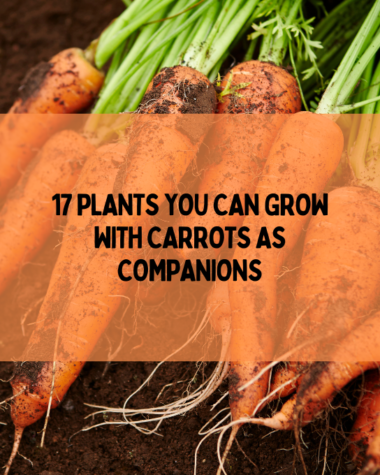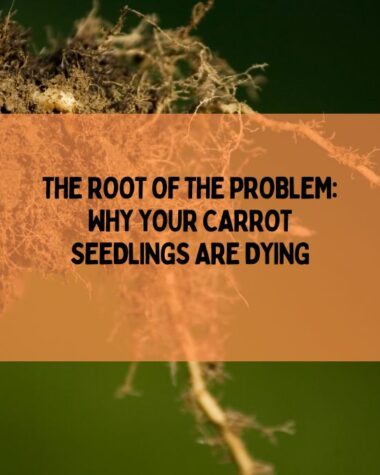How To Improve Soil Quality To Grow Carrots? Soil Testing, Soil Aeration, Composting, Mulching, Crop Rotation, and Cover Cropping.
Growing healthy carrots requires good soil quality as it plays a crucial role in the growth and development of carrots. Soil quality can be defined as soil’s physical, chemical, and biological properties that influence its ability to support plant growth and ecosystem functioning.
This article will discuss improving soil quality for growing healthy carrots using the MECE (Mutually Exclusive, Collectively Exhaustive) framework.
The MECE framework is a structured approach to problem-solving that involves breaking down a problem into mutually exclusive and collectively exhaustive parts. Using this framework, we can ensure that all possible solutions are considered and that there is no overlap or duplication.
In this article, we will apply the MECE framework to identify and discuss the various methods of improving soil quality to grow the best carrot varieties.
Now, let’s dive into how to improve soil quality for growing healthy carrots.
Understanding Soil Composition

Soil is a complex mixture of organic and inorganic materials, which include minerals, water, air, organic matter, and microorganisms. The physical and chemical properties of soil play a significant role in determining plant growth and development.
The physical properties of soil refer to its texture, structure, and porosity. Soil texture is the proportion of sand, silt, and clay particles present in the soil. The soil texture affects water retention, drainage, root growth, and nutrient uptake.
Soil structure refers to how the particles are arranged and forms aggregates or clumps. The structure of soil influences water infiltration, aeration, and root penetration. Porosity refers to the space between soil particles and how well air and water can move through the soil. Adequate porosity allows for good drainage and aeration, essential for healthy plant growth.
The chemical properties of soil refer to the soil’s pH, nutrient content, and organic matter. Soil pH measures the soil’s acidity or alkalinity, affecting nutrient availability and plant uptake.
Plants have different pH preferences, and soil pH should be adjusted accordingly. Nutrient content refers to the number of essential plant nutrients, such as nitrogen, phosphorus, and potassium, present in the soil.
These nutrients are essential for plant growth and development, and their availability is influenced by soil pH, texture, and structure. Organic matter refers to decomposed plant and animal material and is critical in soil fertility and structure.
Organic matter improves water retention, nutrient availability, and soil structure, which benefits plant growth.
Related Read
- How to Grow Chantenay Carrots?
- How To Grow Delicious Danvers Carrots?
- How To Grow Imperator Carrots?
Identifying Soil Issues for Carrot Growth

Several common soil issues can negatively impact carrot growth. Identifying these issues is crucial for addressing them and improving soil quality for healthy carrot growth.
One common soil issue is poor drainage. When soil does not drain well, it can become waterlogged, suffocating roots, and rotting. Another issue is compaction, which occurs when soil particles become densely packed and reduce the air and water available to plant roots.
Compaction can also limit root growth, leading to stunted plants. Soil pH is another critical factor that can affect carrot growth. Carrots prefer slightly acidic soil with a pH between 6.0 and 6.8. If the soil pH is too high or too low, it can affect nutrient availability and uptake, leading to nutrient deficiencies and stunted growth.
To identify these soil issues, several methods can be used. A visual inspection of the soil can reveal signs of poor drainages, such as standing water or waterlogged soil. Soil compaction can be identified by examining the soil structure and texture. If the soil is complex and difficult to dig, it may be compacted.
Soil pH can be determined through a soil test, which can be conducted using a kit or by sending a sample to a laboratory for analysis. Soil tests can also determine nutrient deficiencies or excesses affecting carrot growth.
Methods for Improving Soil Quality To Grow Carrots

Improving soil quality is essential for growing healthy carrots. Several techniques can be used to improve soil quality, including soil testing, soil aeration, composting, mulching, crop rotation, and cover cropping.
- Soil Testing: Soil testing is a crucial step in determining the nutrient content and pH of the soil. Based on the test results, the appropriate amendments can be added to adjust the pH and provide the necessary nutrients for healthy carrot growth.
- Soil Aeration: Soil aeration involves perforating the soil with small holes to increase the amount of air, water, and nutrients that can reach plant roots. Soil aeration can help improve soil structure, drainage, and nutrient uptake, which is essential for healthy carrot growth.
- Composting: Composting is decomposing organic matter, such as food waste, yard waste, and leaves, to create a nutrient-rich soil amendment. Adding compost to soil can improve soil structure, increase water retention, and provide essential nutrients for healthy plant growth.
- Mulching: Mulching involves covering the soil surface with organic matter, such as straw, leaves, or grass clippings. Mulching can help regulate soil temperature, reduce moisture loss, and suppress weed growth, benefiting healthy carrot growth.
- Crop Rotation: Crop rotation involves planting different crops in the same area in successive growing seasons. This technique can help improve soil health by reducing pest and disease pressure, preserving soil structure, and replenishing soil nutrients.
- Cover Cropping: Cover cropping involves planting crops specifically to improve soil health. Cover crops, such as legumes, can help fix nitrogen in the soil, improve soil structure, and reduce soil erosion.
Also, Read
- Troubleshooting Carrot Growing Problems: Why Won’t My Carrots Develop?
- Carrot Disease Management: A Comprehensive Guide To Understanding And Preventing Carrot Diseases
- Can You Grow Carrots? / What Are Some Common Carrot Varieties?
Choosing the Right Fertilizer for Carrots

Fertilizer is an essential component in promoting healthy carrot growth. It provides the necessary nutrients for the plant to grow and produce a bountiful harvest. When choosing a fertilizer for carrots, it’s essential to understand the different types available and what to look for to ensure the best results.
There are two primary types of fertilizers: organic and synthetic. Organic fertilizers are made from natural sources, such as compost, bone meal, and fish emulsion, and provide slow-release nutrients to the soil. Synthetic fertilizers are chemically manufactured and quickly release nutrients into the soil.
When choosing a fertilizer for carrots, look for a balanced fertilizer with an N-P-K ratio of 5-10-10 or 10-20-20. These ratios ensure that the fertilizer provides the necessary amounts of nitrogen, phosphorus, and potassium, which are essential for healthy plant growth. Too much nitrogen can lead to excessive foliage growth and small, misshapen carrots.
For organic fertilizers, looking for those with high nitrogen content is essential, as carrots require more nitrogen during their early growth stages. Bone, feather, and blood meals are excellent nitrogen sources for organic gardeners.
When using synthetic fertilizers, following the manufacturer’s instructions carefully is essential, as they can quickly burn plant roots if over-applied. Using them sparingly is also essential, as they can harm beneficial soil microbes and lead to soil imbalances over time.
Preparing the Soil To Plant Carrot
Preparing the soil before planting is essential for promoting healthy carrot growth. Here are some steps to follow to prepare your soil for planting carrots:
- Clear the Area: Remove any rocks, weeds, or debris from where you plan to plant your carrots. This will ensure the soil is free of obstacles that can interfere with carrot growth.
- Loosen the Soil: Carrots require loose, well-draining soil to grow correctly. Use a garden fork or tiller to loosen the soil to a depth of at least 12 inches. This will improve soil aeration and allow for better water and nutrient penetration.
- Amend the Soil: If the soil lacks nutrients, amend it with organic matter, such as compost or well-rotted manure. Mix the amendments into the soil to a depth of at least 6 inches.
- Test the Soil: Before planting, it’s essential to test the soil’s pH level to ensure that it falls within the optimal range of 6.0-7.0 for carrots. If the pH level is too low or too high, add lime or sulfur to adjust the pH level accordingly.
- Create Rows: Use a rake to create rows for your carrots, spacing them at least 6 inches apart. This will allow for proper plant spacing and easy harvesting.
- Water the Soil: After preparing the soil, water it thoroughly to ensure it’s moist to a depth of at least 6 inches. This will provide the necessary moisture for carrot germination and early growth.
Tools and Techniques for Soil Preparation
To prepare your soil for planting carrots, you will need a few essential tools, including:
- Garden Fork or Tiller: Use a garden fork or tiller to loosen the soil to a depth of at least 12 inches. This will improve soil aeration and allow for better water and nutrient penetration.
- Rake: Use a rake to create rows for your carrots, spacing them at least 6 inches apart. This will allow for proper plant spacing and easy harvesting.
- pH Testing Kit: Before planting, it’s essential to test the soil’s pH level to ensure that it falls within the optimal range for carrots. Use a pH testing kit to determine the soil’s pH level.
Planting and Growing Healthy Carrots
Planting and growing healthy carrots involves following a few best practices that promote optimal growth and yield. Here are some tips for planting and growing carrots in healthy soil:
- Planting: Plant carrot seeds directly into the soil, spacing them 1 inch apart and 1/4 inch deep. Cover the seeds with soil and water well.
- Sunlight: Carrots need at least 6 hours of sunlight daily to grow correctly. Ensure your carrot bed receives adequate sunlight, or use grow lights to supplement.
- Watering: Keep the soil evenly moist but not waterlogged. Water the soil deeply once or twice a week, depending on rainfall and soil conditions.
- Fertilizing: Carrots benefit from a balanced fertilizer application before planting and mid-season. Use a fertilizer high in phosphorus for root development.
- Thinning: Thin the seedlings when they reach 1-2 inches tall, leaving 2-4 inches between plants. This promotes proper root development and reduces competition for water and nutrients.
- Mulching: Mulch around the carrot plants to retain moisture and suppress weed growth.
- Pest and Disease Control: Monitor your carrot plants for pests and diseases and take prompt action if necessary. Use organic pest control methods whenever possible.
Harvesting Carrots

Carrots are typically ready to harvest 60-80 days after planting, depending on the variety. Here are some tips for harvesting and storing your carrots:
- Harvesting: Gently pull the carrots from the soil, carefully not to damage the tops or roots. Cut off the tops, leaving about 1 inch of stem.
- Cleaning: Rinse the carrots thoroughly to remove any dirt or debris. Do not scrub or peel them, which can damage the outer layer.
- Storing: Store the carrots in a perforated plastic bag or container in the refrigerator. They will keep for up to several weeks.
Proper watering, fertilizing, and pest control are essential, as is adequate sunlight and soil preparation. Thinning the seedlings and mulching the soil can also promote healthy growth. When harvesting and storing carrots, be gentle and careful not to damage the roots. With these tips, you can enjoy a bountiful harvest of healthy, delicious carrots.
Key Takeaways
Growing healthy carrots requires attention to soil quality, fertilizer, and planting and harvesting techniques. By following the best practices outlined in this article, you can improve the soil quality for growing carrots, identify and address common soil issues, choose the right fertilizer, prepare the soil for planting, and care for your plants throughout the growing season.
You can enjoy a bountiful harvest of healthy carrots with proper care. Constantly monitor your plants for pests and diseases and take prompt action if necessary. By implementing these practices, you can grow healthy and nutritious carrots for yourself and your family.







